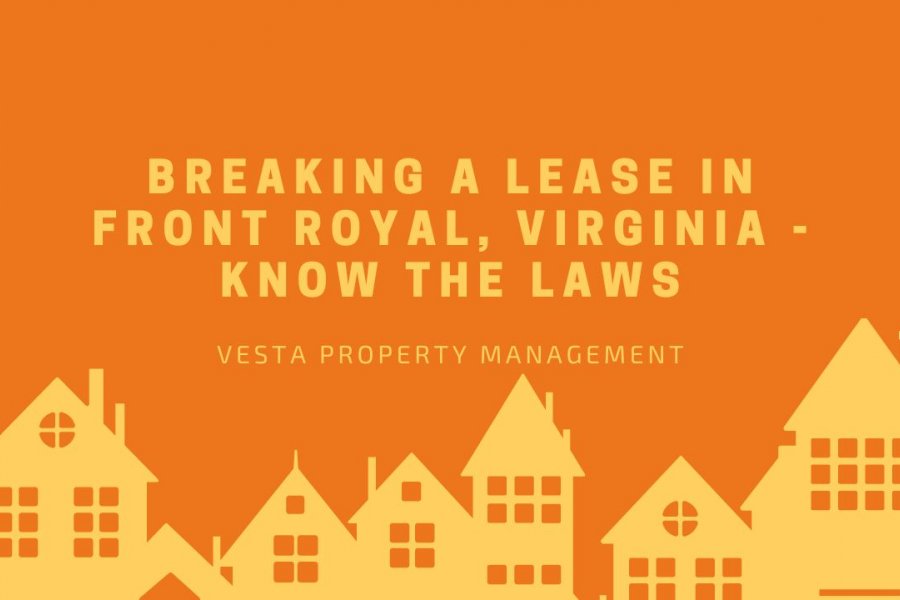
When a tenant breaks a lease, it means that the rental property owner is losing income from rent payments on top of working to find a replacement tenant to rent your home. As a landlord in Virginia, you need to understand the rules about when it is legally acceptable for someone that rents your home to break a lease.
In this article, we will cover justified and unjustified reasons for breaking a lease, so that the landlord will be well-informed about lease obligations, their rights, and your tenants’ rights.
Rental Agreement in Virginia
While having a solid lease agreement is essential, it is also crucial that your Virginia tenants understand their rights for legally breaking a lease and the penalties that come with unreasonably breaking the rental agreement. Avoid misunderstanding by taking the time to discuss this with your Virginia tenant.
Generally, renters are required to send a written notice for terminating their lease. Your rental agreement should include how much written notice a tenant must give a landlord when ending their periodic lease in Virginia. Breaking a lease early is not the same as evicting a tenant.
In the state of Virginia, when a tenant breaks your lease agreement it is expected that they will give the landlord these written notices:
For a month-to-month contract, your renters are required to provide the landlord with written notice within 30 days or less prior to terminating the lease agreement. For a lease with no end date, at least 120 days prior notice is required.
Per Virginia landlord-tenant law, your renters are not required to provide notice for contracts with fixed end dates. It is already understood that the lease expires on the last day stated in the lease.

You should also include your responsibility as a landlord to re-rent the unit.
As a rental owner in Virginia, it is your responsibility to mitigate damages and must make an effort to re-rent the unit to a replacement tenant after the current renter has moved out. If the landlord re-rents the property quickly, the tenant will only be accountable to pay for the time the rental property was vacant.
Finally, a clear lease agreement should also include the tenant’s rights to sublet in Virginia.
Unless otherwise stated in the lease agreement, Virginia tenants may be allowed to sublet the rental property. As a landlord, you have the right to include a clause that would require them to ask for your approval via certified mail before subletting the rental unit.
The formal request letter should contain the following pieces of information:
- Name of the assignee or subtenant.
- Permanent home address of the subtenant.
- Sublet duration or period.
- Reason for leaving permanently or subletting the rental.
- Tenant’s new address during the sublease when applicable.
- The written consent of any co-tenant.
- A copy of the proposed sublease.
As a landlord, it is your responsibility to accept or reject the sublease proposal based on reasonable factors stated in the Fair Housing Act.
Unjustified Reasons to Break a Lease in Virginia
Generally, the below reasons are insufficient justification on their own to release a tenant from the lease.

These reasons will not provide a tenant with legal protection against financial consequences for not honoring the lease.
- The tenant needs a smaller or bigger space.
- The tenant is relocating for a job or school.
- The tenant is moving to be closer to family.
- The tenant is moving in with a partner.
- The tenant bought their own house.
Breaking the lease early without the approval of the court or any conditions outlined previously can have legal repercussions for renters. If the tenant needs to break the lease for any of the reasons stated above, the tenant should formally ask the landlords to agree to a mutual termination.
Justified Reasons to Break a Lease in Virginia
As a landlord in Virginia, you must know the justified reasons for a tenant to break a lease early. Below, a landlord will find justified reasons for the early termination of a lease:
Early Termination Clause
Adding an early termination clause to the lease agreement means allowing your tenants to prematurely break the lease regardless of the reason, for a fee. Be specific when writing this early lease termination clause and indicate the fees tenants need to pay and highlight the number of days the landlord would like to be notified should they decide to use the early termination clause and pay the fee.

Active Military Duty
Tenants who are active service members are protected by law. When they are called for active duty, they have a justifiable reason for breaking the lease or rental agreement. This begins on the day they start active duty and ends between 30 to 90 days after their discharge date.
They must provide their landlord with a copy of the notice of deployment or proof of deployment signed by a commanding officer.
Under Virginia Law, service members means a member of the armed forces, commissioned corps of the Public Health Service, commissioned corps of the National Oceanic and Atmospheric Administration (NOAA), and the activated National Guard.
Unit is Uninhabitable
Most states, including Virginia, have specific health and safety laws that require minimum standards for a habitable rental property.
It is the landlord's duty to be on top of the rental property upkeep and repairs. When a tenant reports damages or any repairs needed in the rental, it is the landlord's duty to address them within a reasonable timeframe. If a landlord fails to provide a habitable rental unit, the tenants can go ahead with early lease termination or refuse to pay rent until the issues are resolved.
Avoid any tangible consequences by being consistent with your routine and preventive maintenance and give your tenants the right to quiet enjoyment.
Having a well-maintained rental unit can keep your renters happy and attract potential tenants to rent your space.

Landlord Harassment
When renting your home, landlords must give their tenants the privacy that they deserve. As a Virginia landlord, you must notify your tenants 24 hours before entering the property. This will give them enough time to prepare for the landlords arrival and avoid surprise visits that may disrupt their scheduled activities for that day. If a landlord fails to do so they are committing landlord harassment.
Under Virginia Law, lockouts are not permitted so you can’t change the locks on the rental space without your tenant’s permission. The tenants will no longer be obligated to honor the lease agreement if the landlord does so.
Conclusion
Now you are well-versed in landlord tenant laws when a tenant breaks a lease in Virginia. If you have any questions about other legal topics like Virginia security deposit laws, please reach out to us today. We are a leading property management company in Front Royal, Virginia and have been working with landlords and investors for years. We’d love to work with you, too! Contact us today at 540-252-4696!
Disclaimer: This blog should not be used as a substitute for legal advice from a licensed attorney in your state. Laws change, and this post might not be updated at the time of your reading. Please contact us for any questions you have in regards to this content or any other aspect of your property management needs.